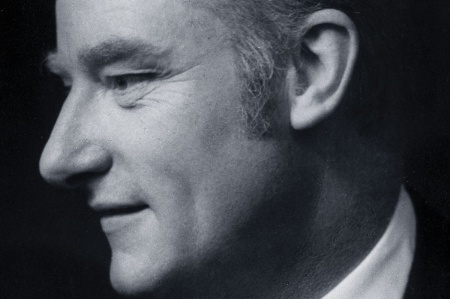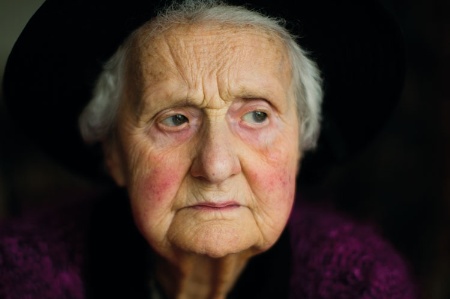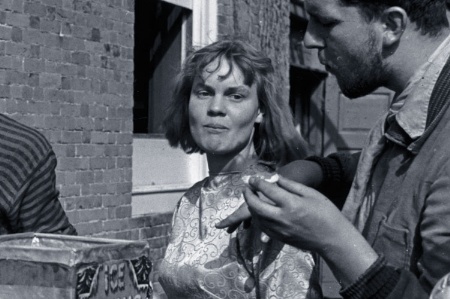Source: James Glossop
‘Are You an Illusion?’ rejects scientism and the idea of scientists as a kind of secular priesthood, the only people who can tell us about the important aspects of reality
Although she is in her mid-nineties and retired from academic life almost three and a half decades ago, there is still quite enough stupidity and loose thinking in the world to spur Mary Midgley to keep writing.
Richard Dawkins has been a long-term irritant, but the impetus for her latest book, Are You an Illusion?, came from Francis Crick and particularly sentences such as: “You, your joys and sorrows, your memories and your ambitions, your sense of personal identity and your free-will, are in fact no more than the behaviour of a vast assembly of nerve-cells and their attendant molecules.” Her reaction, she recalls, was an exasperated “Bugger this! It’s gone on too long…The alleged non-existence of the self is such rubbish.”
Midgley has lived in a house by Jesmond Dene in Newcastle for more than 50 years. Her book-lined study has a treadmill in the corner to improve the muscle power in her legs after a recent bout of ill health. She has enlisted the help of a friend and kindly offers me lunch of soup, bread, cheese and cake as the dishwasher purrs away in the background. We eat off plates from a small town in North Italy, where “a local mountaineer who was also very keen on animals” set up an award which was shared one year between Midgley (for her work on animals) and the ethologist Konrad Lorenz; she describes them as “the only solid prize I have ever won”. Although she is frail and slightly unsteady on her feet, her sharpness and readiness for intellectual battle remain undimmed.
Her philosophical training began at the University of Oxford from 1938 to 1942, where Midgley studied Classics. The second half of the degree included intensive engagement with Plato and Aristotle and she believes that “the very fact they are in a different language is very educational – you have to think about these topics in a way that isn’t absolutely stuck on the English language”.
After teaching and working in the Civil Service for the rest of the war, Midgley returned to Oxford to do postgraduate work. She describes herself as part of a generation of “women who went on to make their names in philosophy [notably Iris Murdoch, Philippa Foot and Elizabeth Anscombe], but that hasn’t gone on happening – and I can easily explain why”. Philosophy is often dominated by an “irresponsible and explicitly gladiatorial style based on putting people down”, but during the war “if you said something in class, it got heard…there weren’t very many men at all and the men who were present were mostly either conscientious objectors or the disabled or ordinands – not a terrifically aggressive lot”.

Midgley started a PhD on Neo-Platonism but abandoned it, partly because of lack of support from a shy supervisor. She then got a lecturing job at the University of Reading for a little over a year, got married and followed her husband Geoffrey to Newcastle University. Although the university offered her a job in the philosophy department, she wanted to have children and declined – “in those days you didn’t do everything at once” – but later took on a part-time and then a full-time position, remaining there until retirement in 1980. There was little pressure to publish and Geoffrey Midgley managed only two, albeit highly influential, articles over his whole career.
Although they never really formed a school, Midgley believes that she and her fellow female philosophers shared an interest in “the idea of human nature” and, at a time when linguistic analysis was all the rage, tried to “come back to the central issues rather than certain verbal matters people were contradicting each other about. There was a temptation to shrink things to a matter of words.”
Big themes are at the heart of Midgley’s first book, published in 1978, Beast and Man: The Roots of Human Nature. When it was completed, her publisher suggested she should take a look at Edward O. Wilson’s vast 1975 book, Sociobiology: The New Synthesis, which argued that population genetics and other biological approaches would soon be able to explain all the aspects of human life that had traditionally been studied by the social sciences and humanities.
Addressing such claims meant that Midgley had to revise radically many elements of her text and that it was “chiefly perceived as a contribution to the sociobiology debate”. Yet the central aim of the book, as she summarises it crisply now, was to “object to our being forced to choose between two extreme views about human nature, that it doesn’t exist, as some social scientists and the existentialists thought, and that it’s very bloody and brutal. I was objecting to a situation where those seemed to be the only alternatives…
“We are really quite like the animals, but the animals are not as awful as we always thought. I had already picked up from Konrad Lorenz and Niko Tinbergen the thought that animals are not necessarily horrible and we don’t have to prove we are completely different from them either for our general credit or for our freedom.”

She is grateful for having lived in an age when she was able to ‘acquire a coherent worldview by the time I started to publish, whereas now people have to publish far too fast’
And that, of course, might have been it. Retiring at 60 with only a single book published, Midgley could easily have ended her writing career then and there. But, 16 books later, it hasn’t quite turned out like that. She is grateful for having lived in an age when she was able to “acquire a coherent worldview by the time I started to publish, whereas now people have to publish far too fast”. Beast and Man had also led to a move away from a focus on academic philosophy, since she “had so much to catch up on in biology, ethology and evolution”.
Her introduction to the revised 1995 edition cites the wry comment of a colleague that “philosophers do not need to keep biting off much less than they can chew” and notes that “the huge scale of modern academic life gives an extraordinary inertia to attractive errors and in particular to feuds, once they are established”. To a philosopher of Midgley’s stripe, certain attractive (and often dangerous) errors have come to seem an irresistible provocation.
When there were plans to close down philosophy departments in Newcastle and elsewhere in the late 1980s, Midgley sought support from a number of leading figures in the discipline. One, she remembers, responded grandly that “you are quite mistaken in trying to keep these small provincial departments open. There’s no use in doing philosophy at that level. It should only be studied properly, ie, at Oxford and perhaps at Harvard.” Her own view, in sharp contrast, is that philosophers since Plato have been “interested in ordinary people and how they should live” and that their core task is “making sense of the different elements of life, seeing life as a whole. Life is intrinsically terribly fragmented – it always was and always will be.”
In any event, the research and reflection that had gone into Beast and Man proved fruitful and Midgley has gone on to produce a series of notably accessible and snappily written books engaging with the Hydra-headed heresies of our time. Many try to steer a careful path between opposed positions, neither of which does justice to the complexities of the case.
A good example is Women’s Choices: Philosophical Problems Facing Feminism, which Midgley co-wrote with Judith Hughes in 1983, where they set out “to find a way between equality and sisterhood, the two extremes in feminism…They are still going on in rows about feminism, which usually come down to: how are we going to combine equality, which requires we get the same sort of things as men even if we’re not quite the same, with the sort of separatist line that only women really understand anything and that the female condition is the only tolerable one?”

In her book before last, The Solitary Self: Darwin and the Selfish Gene, published four years ago, Midgley returned to her long-standing spat with Dawkins. Certain misinterpretations of Darwin, she suggests to me, have a radically impoverished idea of what we are like, “talking about individuals as cut off from each other, self-interested and so on, and failing to take their inner lives seriously. You are not left with much of a self to defend – it’s got so thin it is liable to get even thinner!”
It is the final step, exemplified in the quote from Crick, that Midgley targets in Are You an Illusion?
The book is about “a remarkable gap that has opened up between common sense and today’s scientific orthodoxy”. It rejects scientism and the idea of scientists as a kind of secular priesthood, the only people who can tell us about the important aspects of reality. “Professed exclusive materialism” is fundamentally “not serious” and just a form of “pseudo-scientific humbug”. Far from being “an irrelevance” or “a shameful secret”, subjectivity is “the basic stuff of experience”.
It was a sign of what has gone wrong in certain areas of science, in Midgley’s view, that Jane Goodall was criticised for giving her chimpanzees names and that Darwin’s 1872 book on The Expression of the Emotions in Man and Animals was often dismissed as “the embarrassing lapse of an ageing investigator…clearly tainted by folk psychology” and almost ignored during his centenary celebrations.
The exaltation of the physical sciences obviously has implications for funding within universities. But what are the practical results of the denial of the self, when (as Midgley herself points out) it is hard to believe that anyone really believes in it, with even Crick presumably capable of experiencing and describing “joys”, “sorrows” and “ambitions” when not imprisoned by his scientific rhetoric?
“It leads to a lack of compassion,” she responds, “because people [allegedly] haven’t got feelings. The distortion about psychology is always cropping up over mental illness. There is a choice between treating someone’s behaviour as a physical malfunction and as a mental muddle. But if they haven’t a mind that could have a muddle, it’s got to be a physical malfunction. It’s part of a bias against attending to people’s actual thoughts and feelings.”
Register to continue
Why register?
- Registration is free and only takes a moment
- Once registered, you can read 3 articles a month
- Sign up for our newsletter
Subscribe
Or subscribe for unlimited access to:
- Unlimited access to news, views, insights & reviews
- Digital editions
- Digital access to THE’s university and college rankings analysis
Already registered or a current subscriber?

